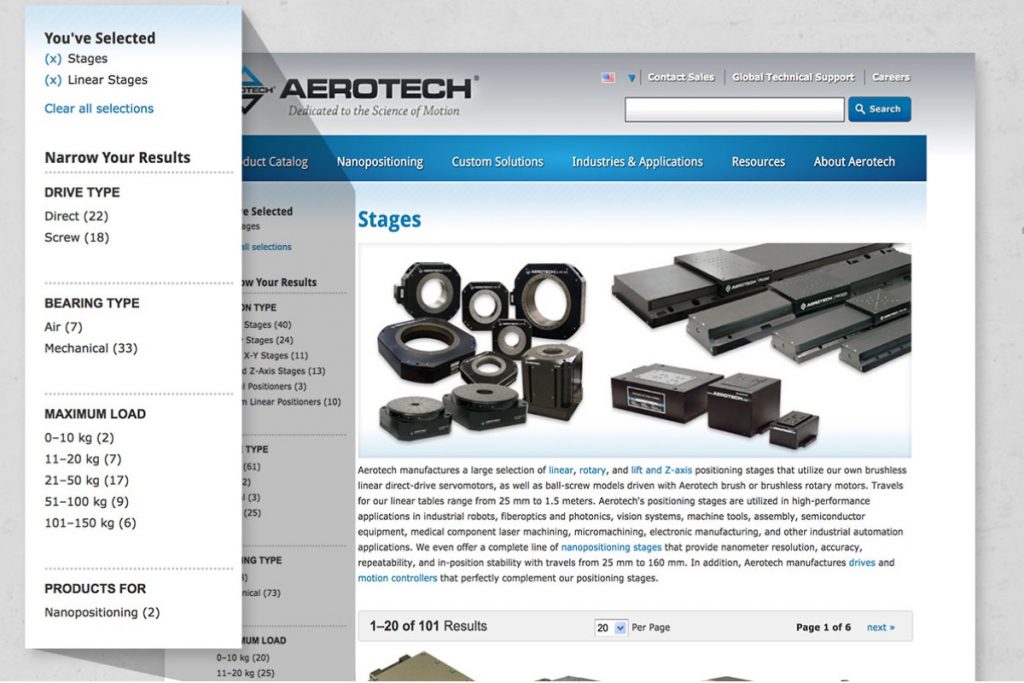| Oct 15, 2012
Manufacturing E-commerce Website SEO Issues

Most manufacturing websites with e-commerce capabilities, or a product catalog, need to be very careful in how they handle their on-site SEO. Good on-page optimization can yield major returns and expand the horizons. On the other hand, sloppy work can lead to disappointed searchers and bad impressions – of your site and of your business. Designers of manufacturing websites need to take a hard look at on-page factors and develop targeted strategies to build up good SEO practices. Below are some on-page SEO factors that can be improved on many manufacturing e-commerce websites:
Content Depth: Manufacturing companies usually have shallow content on their websites, especially the category pages. A typical category page will list all the products in a particular category. Usually the page is devoid of any other content. This creates the ‘thin content’ problem which is usually not a contributor to SEO success. It’s very important to have a healthy amount of content for a page to rank on search engines. Even a small change – like including an introductory paragraph on a category page – will go a long way in search engine ranking success.
Content Differentiation: Many manufacturers catering to a certain market have very similar product offerings. For example, the motors and parts that one manufacturer sells for a particular machine are likely to be quite similar to those sold by a competitor. The result: product specifications that are very similar across competitors. The way to work around this is to differentiate product descriptions on your own site so you can stand out from the competition. Adding reviews, videos and images on product pages will help to introduce content which will separate you from the pack.
Untapped Content: In a lot of cases, manufacturing websites have product brochures hidden away in some dark corner of the website. They are usually not well linked and are not optimized. Bring them into the light! This brochure content represents an untapped opportunity which can give you a lot to work with for your ongoing SEO efforts (and aid in differentiating your content from other competitors).
Relevant Titles, Descriptions and Keywords: A typical search engine result is made up of a title and description which inform the searcher about page content. These two items are the first things a searcher comes into contact with about a site. So it’s crucial to have good titles and descriptions which will encourage a searcher to click through to the site. Manufacturing websites usually have either standard page titles across the entire site or long and non-descriptive titles. Titles should accurately describe a page’s content and fit into the character limit that Google has set for title tags.
As manufacturing e-commerce websites are large, sometimes with thousands of products, the tendency is to move towards automated solutions for optimization. Automated descriptions pull data from preset fields to create a standard description for each page. This can lead to clunky and duplicate descriptions across the site. If possible, try to customize descriptions for each page, especially the high priority pages which you want ranked on search engines. If page descriptions are not relevant to the content on the page, Google usually pulls in content from some part of the page which it feels is more suited. As a site owner, you want control over this all-important content, so make sure you write good descriptions yourself.
Manufacturing e-commerce websites often have keyword tags packed with multiple keywords. These keywords are repeated across the site without any thought to what the content of an individual page is about. The more targeted the keywords are and the closer they are to describing the page content, the better the results will be. Take the time to develop accurate keywords for each page.
Search Engine Friendly URLs: URLs on manufacturing e-commerce sites are dynamically generated in most cases and can be very cryptic with many different parameters. These URLs often get number heavy which makes them unreadable both for users and search engines. Ideally, URLs should be descriptive and should make sense. Add categories and product names to your URLs so a search engine and a searcher both know the content of the page just by looking at the URL. Descriptive URLs can aid in better navigation on site along with providing content relevance to search engines. The Anatomy of a URL infographic on SEOMoz gives great guidance on what to include in your search engine friendly URLs.
On-Site Search: For manufacturing sites, which have large product catalogs, on-site search is a very important tool. Making sure that it’s implemented well and helps site visitors find what they are looking for effectively will really make a difference in how visitors can be retained on the site.
Learn more about our manufacturing marketing and search marketing services.
